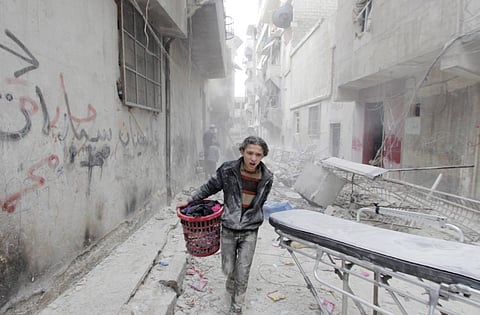Why the Arab intellectual life has dried up
While political turmoil is impeding higher learning, some nations simply lack resources

Nelson Mandela had it right when he set forth the notion that education is the most powerful weapon you can use to change the world you inhabit.
You attend an educational institution not just to get a degree, but also to fervently explore innovative ideas, even those that you do not accept, for if by their nature ideas are dialectical, then we grasp the essence of those ideas only by scrutinising their antithetical opposites. And that’s where higher education becomes a tool through which meaningful progress in social life is achieved and we are thrust beyond our fixed meaning. It is a tool without which development is stalled, if not altogether blocked. In short, an intellectually inquisitive elite is a nation’s most valued social capital.
But higher education, let’s face it, does not thrive in a locale battered by political turmoil. Consider how that kind of turmoil, in several counties in the Arab world in recent years — from Libya to Lebanon, Yemen to Palestine, Syria to Iraq — has wreaked havoc on the ability of a whole generation of young Arabs to acquire even a secondary, let alone a tertiary, education. What asset to the future of Syria, a country whose educational system was ravaged along with its other infrastructure, are those hundreds of thousands of Syrian children who dropped out of high-school and are destined to enter the labour force as semi-literate, unskilled adults?
To be sure, in Iraq, the academic institutions that, in their heydays, Daesh had destroyed, are being rebuilt. When in June 2014 the group’s militants occupied Mosul, they began their occupation by assaulting the University of Mosul, pulverising its entire library — typically for them, a show of contempt for the dictum in Islam that calls on the faith’s adherents to “seek knowledge though located as far away as China”. Yes, Mosul’s university campus is being brought back to life again, as is the university library, “one book at a time”, as the BBC claimed in a news report last week, tellingly titled “Iraqi university rebuilds after IS ‘dark age’”.
Nor did political turmoil help advance higher learning, for example, in Lebanon, when the much-beloved Malcolm Kerr, president of the American University of Beirut (AUB) — who was born, raised and who lived in the Lebanese capital, near the campus, where his own parents had taught for 40 years — was shot and killed in January 1984 by two masked gunmen. The event, as expected, traumatised the university and disrupted academic life for a long time. Who, after all, would’ve wanted to assassinate a revered scholar who published seminal books on the history and culture of the region?
But it is not just political turmoil that is impeding the advancement of institutions of higher learning in the Arab world, but simply lack of resources by economically strapped countries. With the exception of universities in the Gulf region, such as those in the UAE and Saudi Arabia — along with the isolated case of the AUB, which, you will note, is foreign-funded — the world of Arab academia is not only unable to compete with its counterparts elsewhere around the world, but is experiencing regress. You recall, no doubt, the United Nations’ sobering 2003 Arab Human Development Report where we were told, among many other truly shocking revelations, that in one year alone, for example, American researchers published close to 11,000 scientific papers in high-impact scientific journals that were frequently cited, while the entire Arab world published only four.
Sadly, these Arab universities, which get dismally insufficient funding from ministries of education and the private sector, are, along with their students and faculty, trapped in an antiquated system offering low quality education that emphasises rote learning over critical thinking.
Yes, it is sad. It is sadder still when you invoke the Golden Age of the Islamic Commonwealth of Nations, spanning roughly the 8th and 13th centuries, and then consider the disparity between the civilisational achievements of that era and the deadness of spirit that defines it today. It is as if in much of — though clearly not in all — the countries in the Arab world today the springs of intellectual life have run dry.
We cannot live off past glories. This new generation of Arabs has the right to quality education and thus a better future. This is an emotive issue that indeed lies at the core of young Arabs’ quest for a dignified place in the global dialogue of cultures.
Fawaz Turki is a journalist, lecturer and author based in Washington. He is the author of The Disinherited: Journal of a Palestinian Exile.



